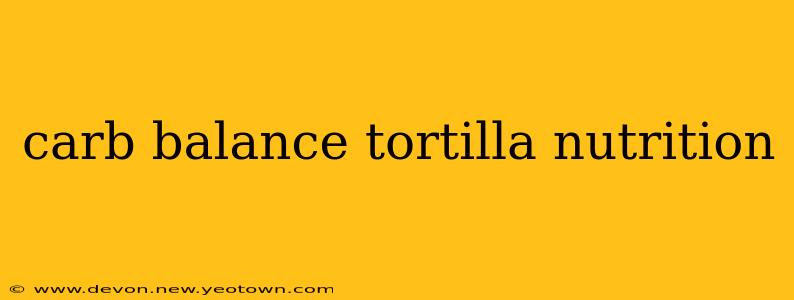Choosing the right tortilla can feel like navigating a minefield of conflicting nutritional information. Are low-carb tortillas truly the healthier option? What about the carb content of traditional tortillas? Let's unravel the complexities of carb balance tortillas and their nutritional profile, helping you make informed choices for your diet.
Our journey begins with a simple question: what exactly makes a "carb balance" tortilla stand out? The answer lies in its unique blend of ingredients and the careful consideration of carbohydrate sources. Unlike traditional tortillas often made primarily from refined wheat flour, carb balance tortillas frequently incorporate ingredients that help to moderate the glycemic impact of carbohydrates. Think of it as a more gradual and sustained release of energy into your bloodstream, avoiding the notorious sugar crash.
What are Carb Balance Tortillas Made Of?
Carb Balance tortillas often feature a combination of ingredients designed to balance carbohydrate intake. Common additions include:
-
Whole Grains: These provide complex carbohydrates, fiber, and essential nutrients. Look for ingredients like whole wheat flour, oats, or other whole grains. The fiber content plays a crucial role in slowing down the digestion and absorption of sugars, preventing spikes in blood sugar.
-
Added Fiber: Some manufacturers add extra fiber to boost the nutritional profile. This further contributes to satiety and better blood sugar control.
-
Alternative Flour Sources: These might include almond flour, coconut flour, or other nut flours to reduce reliance on wheat flour and provide a different nutritional profile. However, these options often result in higher fat content.
-
Seeds and Nuts: Ingredients like flaxseeds, chia seeds, or even nuts can add healthy fats, protein, and fiber to the mix. These additions significantly improve the nutritional density of the tortilla.
Are Carb Balance Tortillas Lower in Carbs?
This is where things get interesting. While the term "carb balance" might suggest a lower overall carbohydrate count, it's not always the case. The key difference lies in the type of carbohydrates. Carb balance tortillas often contain fewer simple carbohydrates and more complex carbohydrates along with higher fiber content compared to standard flour tortillas. It's crucial to check the nutrition label carefully. Don't simply assume a lower carbohydrate count based on the name alone.
How Many Carbs are in a Carb Balance Tortilla?
The carbohydrate content varies significantly depending on the brand and specific ingredients. A typical carb balance tortilla might contain anywhere from 15 to 25 grams of carbohydrates per serving. This is a broad range, so it's essential to check the individual product's nutrition information. Pay close attention to the grams of fiber, too. Fiber isn't digested in the same way as sugars, impacting your blood sugar less.
What are the Health Benefits of Carb Balance Tortillas?
The potential health benefits often stem from the inclusion of whole grains and fiber. These can contribute to:
-
Improved Digestive Health: The increased fiber content can promote regularity and overall gut health.
-
Better Blood Sugar Control: Slower carbohydrate absorption can help prevent blood sugar spikes and crashes, benefiting individuals with diabetes or those aiming for better metabolic health.
-
Increased Satiety: The fiber and protein content in some carb balance tortillas can contribute to a feeling of fullness, potentially aiding in weight management.
Are Carb Balance Tortillas Gluten-Free?
Not necessarily. Many carb balance tortillas still contain wheat, albeit often whole wheat. However, some manufacturers offer gluten-free versions using alternative flours like almond or coconut flour. Always check the ingredient list to confirm if it's suitable for a gluten-free diet.
In conclusion, "carb balance" is a relative term. Understanding the ingredients, comparing nutrition labels, and considering your individual dietary needs are vital when making your selection. Don't rely solely on the name—read the fine print and choose the tortilla that best aligns with your health goals.

